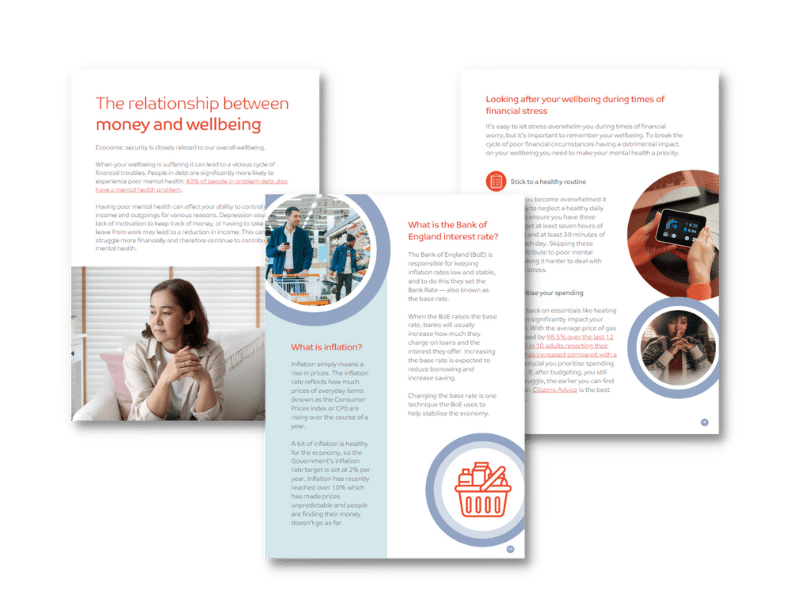The cost-of-living crisis continues to impact the nation. Around 9 in 10 adults report that their cost of living is increasing, including the cost of their food shop, bills and fuel.
Our financial situation can have a big impact on our mental health, especially when the cost-of-living crisis is dominating the daily headlines.
While you can’t control what’s happening in the economy, a few simple changes to your money mindset can help you get a new perspective on your personal finances.
Understand how finance makes you feel
When you’re worried about your finances it can be tempting to dive straight into budgeting, but it’s important to look at your mindset before you change spending habits. This will help you identify any patterns in how you think about money and prevent you from repeating old behaviours.
Here are a few questions you might ask yourself. There are no right or wrong answers, but it can be useful to consider how ingrained thought patterns can impact our feelings about money today.
- What was your family’s attitude to money when you were growing up?
- How do you talk about money in your current relationships?
- Do you tie your net worth to your self-worth?
- Do you admire ‘hustle culture’ — the idea that there’s always more money to make if we work hard enough?
- How does watching or reading financial news make you feel?
- Do you believe having more money will make you happier?
- Do you believe it’s important to put money aside for a rainy day?
Don’t aim for perfection
Be honest with yourself about your spending habits and behaviours, but keep in mind there will always be aspects of your finances you can’t control.
You might not be able to create your ideal budget, reach your savings goal or pay off your debt in the timeframe you’d hoped, but don’t let it stop you from making a start.
Past mistakes can’t be changed, but every positive decision will help you feel more in control of your finances, even in difficult circumstances.
Avoid comparing yourself to others
It can be tempting to compare your financial situation to that of your family, friends and neighbours, especially those who post on social media. But it’s important to remember that you only see a small glimpse into people’s lives.
Be wary of thought patterns that link financial success with your sense of self-worth. We’re often bombarded with images of people who choose to spend their cash on designer clothes, flashy cars and holidays, but it’s important to remember that displaying wealth is not the same thing as being financially stable.
Create healthy money habits
Your daily habits are one of the main contributors to your overall sense of wellbeing, and our financial behaviours are no exception. Try these habits to help you build a healthy money mindset:
- Set yourself a SMART money goal. SMART goals are specific, measurable, achievable, relevant and time bound. This could be something really simple, like reducing your spending on takeaways by £20 a month or changing your thermostat temperature and measuring the impact on your gas bill.
- Consider using a budgeting app to see where your money goes each month and adjust your priorities where possible.
- Practise communicating about money in your relationships. It can be really hard to talk about money, but it’s important to be open and honest with those who you share financial ties with. Speaking up will help you face your money worries as a team.
- Don’t be tempted by ‘get rich quick’ schemes — when times are tough, it’s more important to get the basics right and keep a sense of control over your finances.
- Habits that are tied to our emotions can be the hardest to break. It might take a while to see the impact of your new habits on your bank balance, so be kind to yourself as you work towards your financial goals.
Try our free financial wellbeing guide
For more help and advice on looking after your wellbeing in the cost-of-living crisis you can download our free PDF guide. It includes loads of practical advice and resources to help take care of your wellbeing in times of financial stress.
Looking after your wellbeing during the cost-of-living crisis
